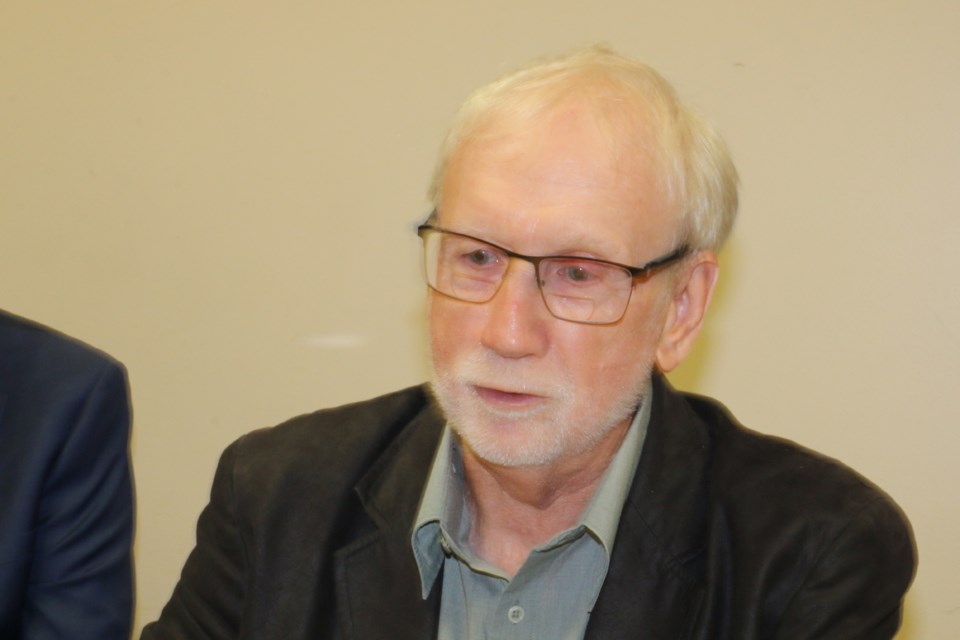A new study outlining the concerns of Ontario nurses is the impetus for a Northern Ontario media tour by a couple of health care advocates who say the Ontario government needs to act urgently and quickly to resolve the staff shortage crisis.
Dr. James Brophy, a researcher affiliated with the University of Windsor, and Michael Hurley, president of OCHU-CUPE, the hospital division of the Canadian Union of Public Employees (CUPE), shared details of the study — called Running On Empty — which outlines how the mental health of Ontario hospital workers is being impacted by the what they called the deteriorating health system in Ontario.
The peer-reviewed study is based on 26 in-depth interviews with CUPE hospital workers including nurses, personal support workers, and clerical staff. Authored by Brophy and Hurley, as well as Dr. Margaret Keith Dr. Craig Slatin, the study was published Aug. 8 in “New Solutions: A Journal of Environmental and Occupational Health Policy”.
The qualitative study was complemented by a poll surveying 775 hospital workers, including those working in Sudbury and other venues in Northern Ontario, said Brophy.
The press conference included a video presentation that featured anonymous interview clips from Ontario health care workers describing their concerns.
"You think it can't get any worse, and it just got worse. I was going through increasing panic attacks before work, crying before I got out of the car. I loved going to work when I first started. Now I dread it," said one woman, an outpatient clinic nurse.
Another nurse said that the shortage of health-care workers had created a two-year backlog, meaning that patients with various ailments had been waiting that long for a medical appointment.
Another worker expressed the opinion that the pressure on health-care workers was such that patients were not getting the level of care they needed and there was a significant concern that someone could make a mistake or misdiagnose a medical condition, which could be disastrous.
Another nurse described that while she knew she could be providing better care for any of her patients, she could only do so much. She said that caused anxiety and guilt.
Although the number of the subjects in the study was 26 individuals, Brophy said the purpose of the study was not to include large numbers of people, but rather to document the real and lived experiences of people closely tied to the health-care system. He said it is an academically valid approach.

"This is a very bona fide method and it's a very revealing method, very robust in what it shows us," said Brophy.
"So we wanted to see what was behind the numbers. Why were people leaving? Why were they, say, feeling so depressed? Why was there so much anxiety and dissatisfaction?” Brophy said. “I think that the interviews reveal that. And we did talk, as I mentioned, to nurses, we talked to PSWs, we talked to clerical workers, we talked to cleaners, you know, we talked to everybody, and the story from all of them was the same."
Brophy and Hurley said the health care staffing shortage is now a crisis and needs government intervention as quickly as possible. Brophy said the Ontario health system has been gradually eroded since the Premier Mike Harris days (1995-2002). He said Ontario's health-care system has been understaffed and under-funded for nearly 30 years.
Hurley said he doesn't see how Ontario can move forward at all without the Conservative government moving to take quick action.

"You would think that you could expect, in the next session of the legislature, some significant announcements from the government to address this crisis. You would certainly expect that. I would certainly expect that," said Hurley.
The 16-page study concluded that Ontario’s Conservative austerity approach to health care is a major contributor to the staffing crisis and is causing a mass exodus of health-care workers.
"Society should be truly alarmed by this crisis, its implications for the work force and the quality of care that hospital patients receive. Energetic measures to moderate workloads across the hospital workforce, including nurse-to-patient ratios, are urgently required," said the study.
